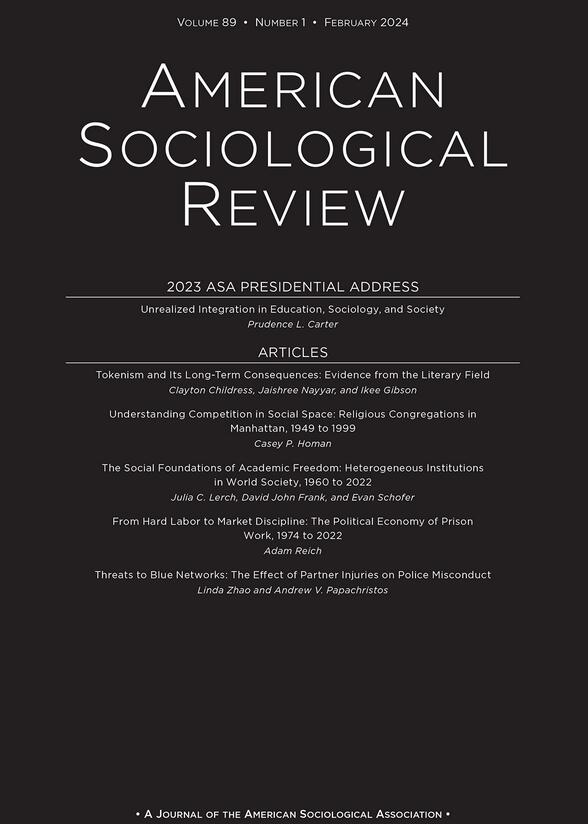Selfish or Substituting Spirituality? Clarifying the Relationship between Spiritual Practice and Political Engagement
IF 6.2
1区 社会学
Q1 SOCIOLOGY
引用次数: 4
Abstract
Churches have long been sites of local charity work as well as national political movements. What happens when people engage in more individualistic forms of spirituality, like mindfulness meditation or yoga, rather than participate in religious communities? Might the rise of individualized forms of spirituality lead to a decline in political engagement? Or, among people averse to religion, might spiritual practice operate as a substitute, and potentially contribute to political engagement? Drawing on burgeoning theory of religion and spirituality as socially-situated boundary objects, we use data from the 2020 National Religion and Spirituality Survey to examine the relationship between self-reported spiritual and religious practices and political engagement. First, we investigate whether study participants distinguish spiritual and religious practice as distinct concepts through factor analysis. Next, we use those results to examine the association between these practices and reports of political behavior. We find a consistent, positive relationship between spiritual practice and political engagement of comparable magnitude to that of religious practices. Notably, during an era of heightened political polarization around religious engagement, political progressives, respondents of color, and members of the LGBT community are more likely to report spiritual rather than religious practices. This points us to a theory of spiritual practice as a substitute for religious engagement among groups alienated from religious institutions, with the former capable of fostering similar proclivities for political action as the latter. Our results suggest critiques of a “selfish” spirituality have been overblown.自私还是替代精神?厘清精神实践与政治参与的关系
教堂长期以来一直是当地慈善工作和全国政治运动的场所。当人们从事更个人主义的精神形式,如正念冥想或瑜伽,而不是参加宗教团体时,会发生什么?个性化精神形式的兴起是否会导致政治参与度的下降?或者,在反对宗教的人中,精神实践是否可以作为一种替代,并可能有助于政治参与?根据宗教和精神作为社会边界对象的新兴理论,我们使用2020年全国宗教和精神调查的数据来研究自我报告的精神和宗教实践与政治参与之间的关系。首先,我们通过因素分析来调查研究参与者是否将精神和宗教实践区分为不同的概念。接下来,我们用这些结果来检验这些做法与政治行为报告之间的联系。我们发现精神实践和政治参与之间存在着一致、积极的关系,其程度与宗教实践相当。值得注意的是,在围绕宗教参与的政治两极分化加剧的时代,政治进步派、有色人种受访者和LGBT社区成员更有可能报告精神而非宗教实践。这向我们指出了一种精神实践理论,它可以替代与宗教机构疏远的群体之间的宗教参与,前者能够培养与后者类似的政治行动倾向。我们的研究结果表明,对“自私”精神的批评被夸大了。
本文章由计算机程序翻译,如有差异,请以英文原文为准。
求助全文
约1分钟内获得全文
求助全文
来源期刊

American Sociological Review
SOCIOLOGY-
CiteScore
13.30
自引率
3.30%
发文量
35
期刊介绍:
The American Sociological Association (ASA) is a non-profit membership association established in 1905. Its mission is to advance sociology as a scientific discipline and profession that serves the public good. ASA is comprised of approximately 12,000 members including faculty members, researchers, practitioners, and students in the field of sociology. Roughly 20% of the members work in government, business, or non-profit organizations.
One of ASA's primary endeavors is the publication and dissemination of important sociological research. To this end, they founded the American Sociological Review (ASR) in 1936. ASR is the flagship journal of the association and publishes original works that are of general interest and contribute to the advancement of sociology. The journal seeks to publish new theoretical developments, research results that enhance our understanding of fundamental social processes, and significant methodological innovations. ASR welcomes submissions from all areas of sociology, placing an emphasis on exceptional quality.
Aside from ASR, ASA also publishes 14 professional journals and magazines. Additionally, they organize an annual meeting that attracts over 6,000 participants. ASA's membership consists of scholars, professionals, and students dedicated to the study and application of sociology in various domains of society.
 求助内容:
求助内容: 应助结果提醒方式:
应助结果提醒方式:


